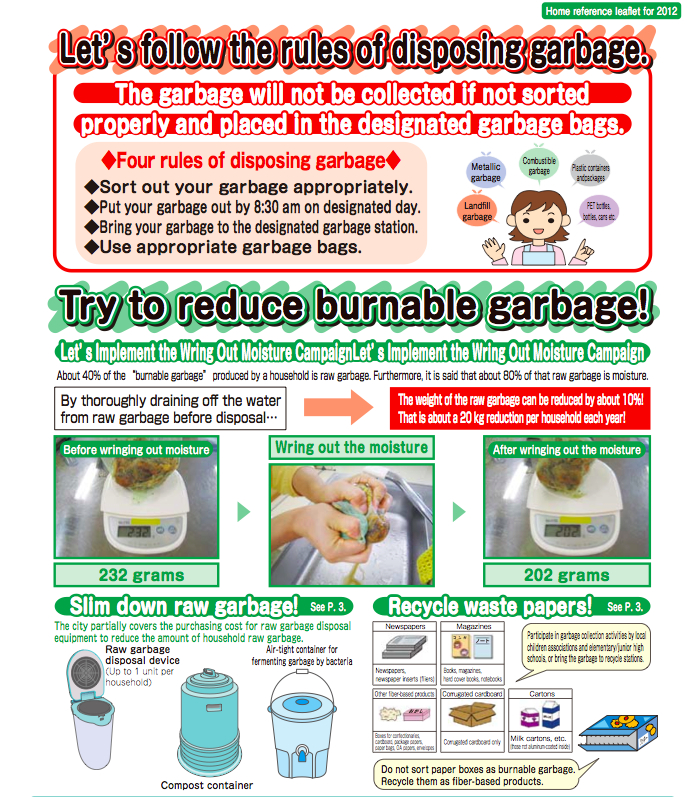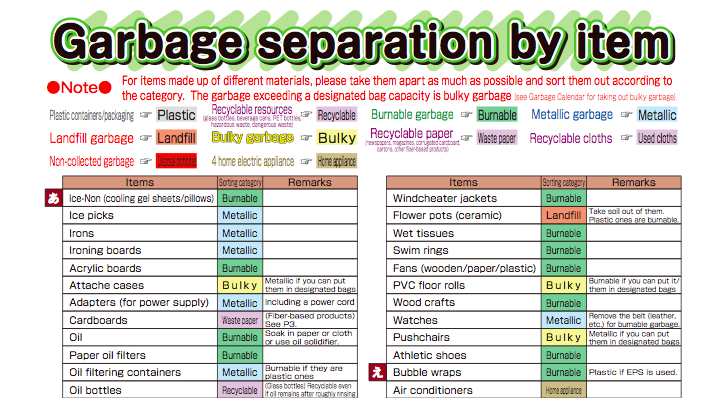Taking Out the Garbage in Japan
In the U.S. taking out the garbage is easy. I have a bin for recycling and for regular garbage and on the assigned day of the week for my street, Monday, I pull the bins out to the curb for pick up. When I get home from work the bins are empty and I roll them back into my garage. With only one day a week with only two bins to deal with it is super simple.
When I was living in Japan it was a different story for me. In the U.S. in most areas we don't have to separate our recycling but in Japan you do. To an outsider it can be a little confusing with all the different categories and rules for sorting and disposal.
Among the expat community garbage stories abounded. There was the person who wasn't sure how to dispose of Pringles cans so he saved them in a bag and left them in the hotel room he stayed at the night before moving back to his home country. There was the person who accidentally put a fruit peel in the wrong bin at work and came back from a meeting to find that a Japanese co-worker had put it back on his desk. And of course there were several stories of people decided to ship something back home to throw away there rather than figure out how to get rid of the item in Japan.
Personally, I had a co-worker explain to me that I was throwing out my soda bottles in the wrong manner at work. First, you rinse the bottle. Then you remove the cap and label with each going in a separate bin. Finally you put the bottle in a crusher apparatus you stomp on with your foot and then place the bottle in the plastic bin. This all may seem ridiculous but until you have lived it, it is a little hard to understand how it can be that complicated.
Needless to say, when I first moved to Japan I was a bit preoccupied with my garbage. I didn't want to be the clueless foreigner who was doing it wrong not to mention that if you make a mistake they simply won't take your bag.
First you have to have the proper bags. Each town has local bags that are marked with the town name and what type of garbage should go inside. They are clear so that the contents can easily be seen and the labeling is color coded. Where I lived in Toyota City plastic went in a black bag, burnable went in a green bag and metal went in a blue bag for example. My friends who lived in Nagoya had completely different bags with different colors.
Next you have to make sure that you are putting the correct thing in the correct bag. For recylable things like paper and plastic there is a little icon printed on the item to let you know, however it was not as easy as it seems. There were a lot of unwritten rules that weren't obvious like clean paper should get recycled but if the paper was dirty it should go in the burnable bag.
With the garbage sorted you have to make sure that you put the right items out at the right time. Burnable garbage was picked up every week on Tuesday and Friday, plastic every week on Monday, metal once a month on the second Wednesday and landfill once a month on thee fourth Wednesday. For the items picked up weekly it wasn't such a big deal but trying to remember to take the monthly items out on the right day was tough. I had one bag of metal items that I missed getting out two months in a row accidently. Below is the sign posted in my local garbage pick up area indicating the dates of pickups and a few example items that go in a particular type of bag. This wasn't terribly helpful to me since I didn't need to know how to throw out plastic robots or cinder blocks. I needed more practical advice on how to throw out a milk carton. I later determined that milk cartons needed to be flattened in a specific way and turned it at a bin at the grocery store. Obviously!
Lucky for me, my drop off point for my garbage was just outside my apartment building. It was a small concrete and tiled area with a net over it to keep birds out. When I first moved to Japan I would take a look at what types of items people were putting in which types of bags so I could make sure I was getting it right.
For items that are not picked up at the drop off spots you need to take them to recycling centers. At the end of my time in Japan the larger items that would have required bulky disposal (which you have to pay for) I was able to sell or give to other expats or to sell back to a recycle shop so I didn't need to worry about it.
I took a look at the Toyota City website while writing this and found they now have a detailed list of how various items should be thrown away. They even have versions in other languages included English. I sure wish I had that while I was living there! All of my garbage questions would have been easily answered in this fourteen page document.
The first page has a landmine of information. If I had this when I was in Japan I would have known the process for throwing away my soda bottles without having my colleague needing to tell me I was doing it wrong. Also, please note the recycling mascot character in the top right. It's name is Risa which I am guessing is short for the word recycle in Japanese (pronounced risakuru). Risa also happens to be how my name is pronounced in Japanese. Coincidence, I think not...

On this page I learned that I had been completely clueless to the fact that I was supposed to be wringing out my garbage before throwing it away. On my next trip to Japan I will implement.

They are even eight pages dedicated to listing up various items and telling you which of the disposal methods you should use. The list is in order of how you would find the Japanese equivalent word in the dictionary so finding the right item is a bit tough in the English document, but this is still an awesome resource. I always wondered how you would dispose of swim rings and now I know that they are totally burnable garbage.

I've just shared a few snipets of this Japan garbage disposal instruction treasure, but if you want to check the whole document in it's glory here it is: Toyota Region Garbage Home Reference Leaflet for 2012. Looking back it makes me happy that now all I need to do this week in the U.S. is roll two bins to the curb for my garbage pick-up. I will never take my garbage pick-up for granted again!
 Thursday, January 31, 2013 at 9:05AM | Posted by
Thursday, January 31, 2013 at 9:05AM | Posted by  Lisa |
Lisa |  11 Comments | |
11 Comments | |  Email Article |
Email Article |  Print Article
Print Article 

Reader Comments (11)
Good story. I often write in my gratitude journal I have thankful for curb side garbage pickup. We are also fortunate to have a recycle centre close by. We have to put our garbage in purchased yellow bags along with our blue recycling bins - nice colour combo. In neighbouring Guelph there are VERY strict rules and they sort into 3 types of bags, all colour coded and not all types are picked up at the same time. I think most communities are becoming stricter about what you can throw away. In our county they give prizes to the best recycling family per month. All these rules sure make you think about what you (1) buy (2) throw away (3) recycle. Oh yes, I have done a scrap page about our recycle centre and when I was taking pictures, another lady was there doing the same thing ...... scrapping does go across all boundaries :-)
Wow, that's incredible, I had no idea there were so many rules there about garbage. You had me laughing out loud a few times 'Risa'! Great story!
I'm very lucky too, Monday pick-up of 2 bins provided by the city, one garbage and one mixed recycling. I have to say I'm a bit smug that we generally have more recycling than garbage unlike most of our neighbors!
Lisa I re-read all your garbage details and you said "On my next trip to Japan I will implement." - are you planning another long term stay in Japan?
That is so interesting! I can't imagine having to be that precise with something I just want to get rid of. And that's hilarious about people mailing their garbage back home because they didn't know what to do with it while they were in Japan. :)
That is quite a system. I'm not sure I could keep up with it all. Then I'd turn into one of those hoarder people who piles trash up because they don't know how to get rid of it. Wonder if that happens in Japan....hmmm
Mary-Lou- I am thankful for curbside pickup, too! You never really think about those small conveniences until you don't have them anymore. Also, I am not planning on moving back to Japan. I just meant next time I am there for a business trip.
Hilary- There are so many lost in translation moments that I've had in Japan that I think are funny but I am not sure how they will come off so I am glad that you thought it was funny.
Sandy- When you are about to head home and you have to get rid of things it is super stressful. My one friend who lived in Nagoya and didn't have a sea shipment home brought large things down to her trashroom in the basement of her apartment building and just left it there. Within an hour (really, an hour!) someone had determined it was her stuff and her relocation agent had called her to let her know that she had improperly disposed of her items and needed to buy bulky pick-up tags.
Rene- One of the main way that a lot of the expats deal with getting rid of things that I saw was to pawn things off on new expats who don't yet realize how hard it is to get rid of things. I had a junky old TV that I inherited that had been owned by at least two expats before me that I passed on to another person before leaving.
I'll bet that these rules make people in Japan think long and hard about buying anything they don't REALLY need.
Skip Hire Esher provides easy, reliable and tension free house and office clearance services all around the UK. Our team is experienced enough to give the ideal house clearance services as well. When you think that you are in need of skip for keeping your junk just let us know and we will provide it to your location.
Thanks for sharing! This is very interesting.
This is very interesting and helpful information for us. Thanks for sharing this information.
Buy FC 26 Coins Cheaper and more reliable than other platforms!